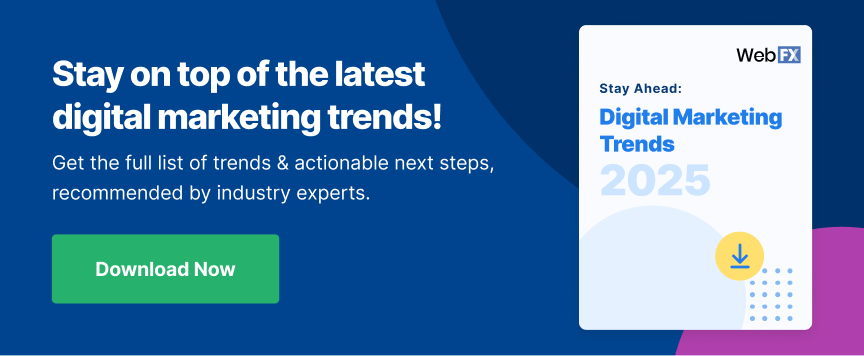-
 Published: Oct 27, 2025
Published: Oct 27, 2025
-
 6 min. read
6 min. read
-
Summarize in ChatGPT
-
 Matthew Gibbons
Matthew Gibbons Senior Data & Tech Writer
Senior Data & Tech Writer
- Matthew Gibbons is a Senior Data & Tech Writer at WebFX, where he strives to help businesses understand niche and complex marketing topics related to SEO, martech, and more. With a B.A. in Professional and Public Writing from Auburn University, he’s written over 1,000 marketing guides and video scripts since joining the company in 2020. In addition to the WebFX blog, you can find his work on SEO.com, Nutshell, TeamAI, and the WebFX YouTube channel. When he’s not pumping out fresh blog posts and articles, he’s usually fueling his Tolkien obsession or working on his latest creative project.
Table of Contents
- 1. Use of artificial intelligence (AI) and machine learning
- 2. Hyperpersonalization
- 3. First-party data integration
- 4. Martech and Adtech integration
- 5. Low code and no code solutions
- 6. Virtual reality (VR) and augmented reality (AR)
- 7. Voice search optimization
- 8. More streamlined data management
- Implement all of these martech trends with the help of WebFX
Top Marketing Technology Trends for 2026
In 2026, important marketing technology trends include utilizing artificial intelligence (AI) and machine learning, integrating martech and adtech platforms, hypersonalization, a greater focus on first-party data and privacy, utilizing virtual reality and augmented reality technologies, and more.
If you want to keep up with the future of martech, you should make a point of staying on top of all the latest marketing technology trends. Thankfully, we’re here to help you do just that.
Below are eight of the most prominent martech trends out there, so read on to learn more about each of these marketing tech trends.
 View Post: Digital Marketing Trends
View Post: Digital Marketing Trends
1. Use of artificial intelligence (AI) and machine learning
At this point, you’re probably sick of hearing the term “AI.” And you’re not alone — it’s impossible to get away from it. Every company that deals with tech is shoving AI into everything they sell. And that most definitely includes martech companies.
These companies are implementing AI tools more and more in a bid to stay relevant. Some of those AI tools are superfluous, but others have valid uses. For example, AI can be great for tasks like predictive data analytics (more on that later).
This isn’t the sort of trend that necessarily requires you to do anything. Rather, it’s good to be aware that you can expect to see a lot more AI in your marketing tools.
2. Hyperpersonalization
Personalization has always been vital to marketing. When your campaigns are tailored to specific customers, it makes them much more effective at driving conversions. But a recent marketing tech trend is something called hyperpersonalization, which is personalization to an extreme degree.
This level of personalization is made possible in part by the AI mentioned in the previous trend, and it focuses on using advanced data analytics to personalize marketing campaigns to individuals. This process looks different across each tool, but one example might be showing different website elements to users depending on their past behavior.
Given the rise of this trend, it would be smart to invest in some tools that allow you to improve your marketing personalization.
3. First-party data integration
Gathering data is crucial for driving successful marketing campaigns. And the best type of data you can get ahold of is first-party customer data. That refers to data that’s drawn directly from marketing campaigns that your customers interact with.
It’s no surprise, then, that first-party data integration is becoming a bigger priority for marketers in 2026. Martech companies are also making a point of upgrading their first-party data gathering capabilities, with platforms like Google Ads and Facebook Ads making it easy to send over first-party data for more accurate ad targeting.
To keep up with this trend, make sure you’re looking for effective ways to gather more first-party data, and then use that data heavily in your analytics.
4. Martech and Adtech integration
In 2026, we’ll see more businesses ensuring their marketing technology (martech) and advertising technology (adtech) stacks are integrated and sharing data and information with each other seamlessly.
Syncing all of your tools and platforms is essential now more than ever. This integration allows you to unify your data, track marketing trends across all your platforms, provide a seamless user experience, and inform your marketing strategies.
Bringing these tools together is the only way to truly understand the performance of your campaigns and strategies and get a true picture of your data and results.
5. Low code and no code solutions
With more and more businesses adopting marketing technology, so too are companies looking for easy-to-use tools that require no coding or low coding solutions.
This means that building your tech stack with easy-to-use tools that require little tech support to set up or use is extremely popular.
There are many marketing platforms and tools available that have user-friendly interfaces and require no to very little coding experience to operate, and these tools will continue to be popular this coming year.
6. Virtual reality (VR) and augmented reality (AR)
Augmented reality and virtual reality will become more powerful tools for marketing in 2026, enabling companies to create more immersive and interactive experiences with their brand.
For example, some VR and AR tools allow users to place products like furniture inside their home to see what it will look like. Other platforms can also allow users to virtually try on clothes, glasses or other products and accessories.
As we move into 2026, we can expect more companies to utilize VR and AR technologies to allow users to interact with their brand in ways that were once only possible through in-person experiences.
7. Voice search optimization
Martech trends aren’t always about the tools you use. They’re sometimes about the tools your audience uses. That’s why one marketing tech trend that’s stayed constant over the last few years is voice search optimization.
More and more people are using assistants like Alexa and Siri to perform searches online, asking their questions aloud. That means if you want to stay on top of your search engine optimization (SEO) game, you need to optimize for those searches.
The best way to optimize for voice search is to target keywords that take the form of full sentences, particularly questions. Be sure to clearly and directly address those questions in the content you create. That gives you a much better chance of appearing in the voice search results.
8. More streamlined data management
Given the importance of data to your marketing, which we’ve already discussed elsewhere on this page, it’s equally important that your data be well-managed. When your data is repetitive, inaccurate, or disorganized, it won’t be of much benefit to you.
For that reason, one of the biggest marketing technology trends right now is a greater focus on streamlining data management. Basically, that means companies are putting more effort into keeping their data organized, as well as cleaning it — that is, combing through it to remove inaccurate or repetitive data.
Consequently, these companies are seeing much greater results from their analytics processes.
Implement all of these martech trends with the help of WebFX
It can take a lot of time, effort, and expertise to keep up with the ever-shifting landscape of marketing technology, which can be challenging when you’re already devoting so much time just to managing your existing tools and campaigns. That’s why many businesses opt to partner with a professional marketing agency like WebFX.
With our digital marketing services, you’ll be able to offload the work onto us while still maintaining full control of your campaigns. Plus, you’ll be able to access one of the most effective martech tools out there — RevenueCloudFX, our very own proprietary marketing software.
Interested in partnering with us? Just give us a call at 888-601-5359 or contact us online to get started!
-
 Matthew Gibbons is a Senior Data & Tech Writer at WebFX, where he strives to help businesses understand niche and complex marketing topics related to SEO, martech, and more. With a B.A. in Professional and Public Writing from Auburn University, he’s written over 1,000 marketing guides and video scripts since joining the company in 2020. In addition to the WebFX blog, you can find his work on SEO.com, Nutshell, TeamAI, and the WebFX YouTube channel. When he’s not pumping out fresh blog posts and articles, he’s usually fueling his Tolkien obsession or working on his latest creative project.
Matthew Gibbons is a Senior Data & Tech Writer at WebFX, where he strives to help businesses understand niche and complex marketing topics related to SEO, martech, and more. With a B.A. in Professional and Public Writing from Auburn University, he’s written over 1,000 marketing guides and video scripts since joining the company in 2020. In addition to the WebFX blog, you can find his work on SEO.com, Nutshell, TeamAI, and the WebFX YouTube channel. When he’s not pumping out fresh blog posts and articles, he’s usually fueling his Tolkien obsession or working on his latest creative project. -

WebFX is a full-service marketing agency with 1,100+ client reviews and a 4.9-star rating on Clutch! Find out how our expert team and revenue-accelerating tech can drive results for you! Learn more
Try our free Marketing Calculator
Craft a tailored online marketing strategy! Utilize our free Internet marketing calculator for a custom plan based on your location, reach, timeframe, and budget.
Plan Your Marketing Budget
Table of Contents
- 1. Use of artificial intelligence (AI) and machine learning
- 2. Hyperpersonalization
- 3. First-party data integration
- 4. Martech and Adtech integration
- 5. Low code and no code solutions
- 6. Virtual reality (VR) and augmented reality (AR)
- 7. Voice search optimization
- 8. More streamlined data management
- Implement all of these martech trends with the help of WebFX

Proven Marketing Strategies

Proven Marketing Strategies
Try our free Marketing Calculator
Craft a tailored online marketing strategy! Utilize our free Internet marketing calculator for a custom plan based on your location, reach, timeframe, and budget.
Plan Your Marketing Budget
What to read next




